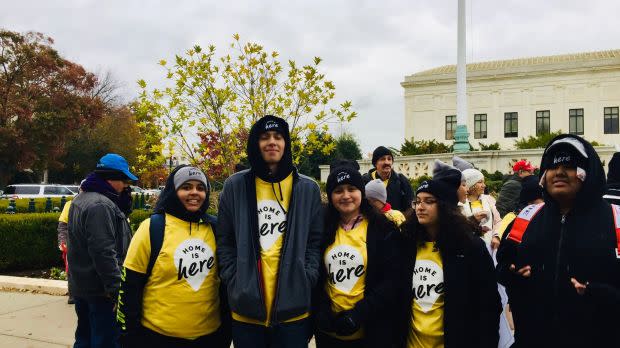Sotomayor on DACA: “This is about our choice to destroy lives.”

US Supreme Court justice Sonia Sotomayor is usually quick on the draw at oral arguments, peppering attorneys with questions. Today, however, she waited to weigh in, only to then make a scathing characterization of the government’s case for rescinding the Deferred Action for Childhood Arrivals (DACA) program.
Introduced in 2012, the Obama-era administrative immigration policy protects some youth brought to the United States as children without proper documentation. The Trump administration rescinded it in 2017. The dispute before the court centers around two major questions: Whether courts can even review the decision, and if so, whether the Department of Homeland Security legal memos supporting the about-face adequately justify such a move.
US solicitor general Noel Francisco is arguing that the decision to rescind is justified by the fact that DACA, which granted immigration officers discretion to not prosecute deportations of certain Dreamers, exceeds presidential power. And he contends that the memos supporting the decision adequately addressed all concerns.
Sotomayor allowed almost everyone else on the bench to pose questions before she laid out her view that the government wasn’t being straight. She believes it is claiming to be concerned about the legality of DACA and the importance of law enforcement but actually playing political games with major consequences. It’s using the law as a pretext to harm a class of undocumented immigrants that she argues is harmless.
Referring to the memos in question, Sotomayor asked Francisco, “Where is the political decision made clearly? That this is not about the law; this is about our choice to destroy lives.”
The memos
The Dreamers, along with institutions where they work and study, challenged the Trump administration’s change of policy, arguing that it didn’t adequately lay out a rationale for a change that no only affects Dreamers, their families, and communities, but all Americans.
Businesses, the military, universities, and the economy also rely on the policy. As such, all those interest were entitled to an explanation that proved the government fully weighed all aspects of the policy change, they say. Because they rely on predictability and clarity in administrative law decisions, they’ve successfully argued in lower courts that, based on their reliance interests, they were entitled to more consideration and elucidation than the memos provided.
Whether the justices will ultimately agree with that claim remains to be seen, but many expressed concerns that the government’s memos may not have been sufficient. Justice Neil Gorsuch was the first to turn discussion to the reliance interests of all the parties affected by DACA.
Justice Stephen Breyer said that he had his law clerks count the number of institutions that submitted and signed onto amicus briefs attesting to their reliance on DACA. He laid out the total for the solicitor general. “There are 66 healthcare organizations. There are three labor unions. There are 210 educational associations. There are six military organizations. There are three home builders, five states plus those involved, I think, municipalities and cities, 129 religious organizations, and 145 businesses [and industry associations],” he said.
Breyer conceded that these organizations’ interests “are not quite the same as those of the 700,000 [Dreamers] who have never seen any other country.” Still, he didn’t seem convinced that the administration laid out the case for changing its policy in light of the many entities who say they relied on the policy’s continuation.
Practically, speaking
Sotomayor also challenged how practical the change of policy really is. She noted that agencies always have to prioritize what actions to take. “I don’t see anything in the [Immigration and Nationality Act] that takes away the discretion of the agency in ordering its enforcement policies,” she told Francisco.
The justice noted that immigration authorities don’t even have the resources to deport all of the more troubling cases. So why not make certain people who did not decide to violate the law but end up on the wrong side of it as children a very low deportation priority?
“I’ve always had some difficulty in understanding what’s wrong with an agency saying, we’re going to prioritize our removals,” Sotomayor said. “And for those people, like the DACA people…who haven’t committed crimes, who are lawfully employed, who are paying taxes, who pose no threat to our security, and there’s a whole list of prerequisites, we’re not going to exercise our limited resources.”
Still, Francisco insisted that “a few more words” explaining why DACA was illegal, according to the Trump administration, and more fully addressing the reliance interests wouldn’t make any difference. After Sotomayor suggested that the government was using the law as a pretext for a political decision—thus choosing to destroy lives—and being impractical and wasteful of precious resources in the process, the solicitor general pushed back.
“The Department of Homeland Security is a law enforcement agency, and a law enforcement agency doesn’t have to push its dubious power to not enforce the law to its logical extreme,” Francisco responded curtly.
Sign up for the Quartz Daily Brief, our free daily newsletter with the world’s most important and interesting news.
More stories from Quartz:
